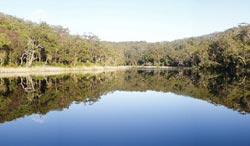Australian Lake Untouched by Climate Change

Ashley Natt.<br> <br>A panoramic photo of Blue Lake on North Stradbroke Island, Queensland, Australia. The lake has been relatively untouched by changes in climate for the past 7000 years<br>
Blue Lake, one of the largest lakes on North Stradbroke Island, southeast of Brisbane, has been the focus of research examining the lake's response to environmental change over time.
Researchers studied the lake's water discharge, water quality and comparisons of historical photos over the past 117 years, as well as fossil pollen and algae to better understand its history over the past 7500 years.
The results, published online in the journal Freshwater Biology, show that Blue Lake has remained relatively stable and resilient for millennia.
“Blue Lake is one of those rare, beautiful lakes in Australia. It's unusual because it's more than 10 metres deep but it's so clear you can see to the bottom,” says the lead author of the study, Dr Cameron Barr from the University's Discipline of Geography, Environment and Population.
“We didn't realize just how unique and unusual this lake is until we started looking at a wide range of environmental markers.
“We know that there have been variations in climate in the region including North Stradbroke Island over recent decades, but during that time the depth, shoreline and water chemistry of Blue Lake has displayed little variation.
“We also know that the region experienced a significant shift towards a drier climate around 4000 years ago. Again, Blue Lake has demonstrated little variation over this period. This is in stark contrast to other changes in the region due to shifts in climate.
“It appears that Blue Lake has been an important climate 'refuge' for the freshwater biota of the region, and is in the same condition now as it was 7500 years ago. With appropriate management, the lake could continue relatively unchanged for hundreds, possibly thousands of years to come,” Dr Barr says.
Project leader and co-author Dr John Tibby, also from the University of Adelaide, says the results of this research could affect decision making about utilising the freshwater aquifer of North Stradbroke Island as a source of fresh water for the mainland.
“Our study suggests that increased extraction of ground water represents one of the few obvious threats to the stability of Blue Lake. The threat this could pose to the lake's status as a stable freshwater refuge needs serious consideration if the regional aquifer of North Stradbroke Island is to be contemplated,” Dr Tibby says.
Media Contacts:
Dr Cameron Barr
Postdoctoral Research Associate
Discipline of Geography, Environment and Population
The University of Adelaide
Phone: +61 8 8313 6921
cameron.barr@adelaide.edu.au
Dr John Tibby
Senior Lecturer
Discipline of Geography, Environment and Population
The University of Adelaide
Phone: +61 8 8313 5146
john.tibby@adelaide.edu.au
Media Contact
More Information:
http://www.adelaide.edu.auAll latest news from the category: Ecology, The Environment and Conservation
This complex theme deals primarily with interactions between organisms and the environmental factors that impact them, but to a greater extent between individual inanimate environmental factors.
innovations-report offers informative reports and articles on topics such as climate protection, landscape conservation, ecological systems, wildlife and nature parks and ecosystem efficiency and balance.
Newest articles

High-energy-density aqueous battery based on halogen multi-electron transfer
Traditional non-aqueous lithium-ion batteries have a high energy density, but their safety is compromised due to the flammable organic electrolytes they utilize. Aqueous batteries use water as the solvent for…

First-ever combined heart pump and pig kidney transplant
…gives new hope to patient with terminal illness. Surgeons at NYU Langone Health performed the first-ever combined mechanical heart pump and gene-edited pig kidney transplant surgery in a 54-year-old woman…

Biophysics: Testing how well biomarkers work
LMU researchers have developed a method to determine how reliably target proteins can be labeled using super-resolution fluorescence microscopy. Modern microscopy techniques make it possible to examine the inner workings…





















